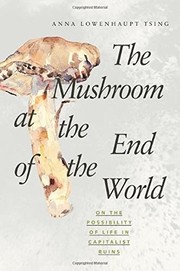Kantolope apžvelgė autoriaus Anna Lowenhaupt Tsing knygą The Mushroom at the End of the World
There Must Be Something I'm Not Getting
3 žvaigždutės
Because of how much I see this book praised in lefty circles, I thought I would love it when I checked it out from the library. But as the title says, there must be something that I'm not getting about this book, because it really didn't click with me. Of course the mushroom imagery and contemplation on living a life in the ruins of capitalism were exquisite, but there were a few niggling things that bothered me. Firstly, I was not too convinced by the author's claim of "We can learn to live in the ruins of capitalism if we follow the example of people who either are or are descended from people who fought explicitly to uphold capitalism and imperial exploitation of their own countries, and people who claim what they're doing is capitalism in its purest form!" Undoubtedly, these people are living a pericapitalist existence to borrow the …
Because of how much I see this book praised in lefty circles, I thought I would love it when I checked it out from the library. But as the title says, there must be something that I'm not getting about this book, because it really didn't click with me. Of course the mushroom imagery and contemplation on living a life in the ruins of capitalism were exquisite, but there were a few niggling things that bothered me. Firstly, I was not too convinced by the author's claim of "We can learn to live in the ruins of capitalism if we follow the example of people who either are or are descended from people who fought explicitly to uphold capitalism and imperial exploitation of their own countries, and people who claim what they're doing is capitalism in its purest form!" Undoubtedly, these people are living a pericapitalist existence to borrow the author's own term, but shouldn't we strive for something more? Something that actually centres community, the refusal of exploitation, and building better and if needed unofficial institutions? And more specifically, something that explicitly names capitalism as the source of these ills, and seeks to find something to transcend it? Something just seemed missing to me there.
The second thing that rubbed me the wrong way was the author's description of Matsutake as being a capitalist product only when it was shipped from Vancouver to Japan. The author's description of Matsutake when it arrives in Japan is that of the seller trying to find the best home for the Matsutake, not necessarily the best price. This disregards the fact that brokers and agents are still valid methods of employment within capitalism, and that if looked at from a materialist perspective, the Matsutake remains a capitalist commodity, that is, something that is produced to be sold on the market, regardless of whether it will be a good fit with its eventual customer. There are more theoretical quibbles that I have, but it seems to me that this is more a work of poetry (in some cases explicitly) rather than the somewhat academic book it claims to be.

